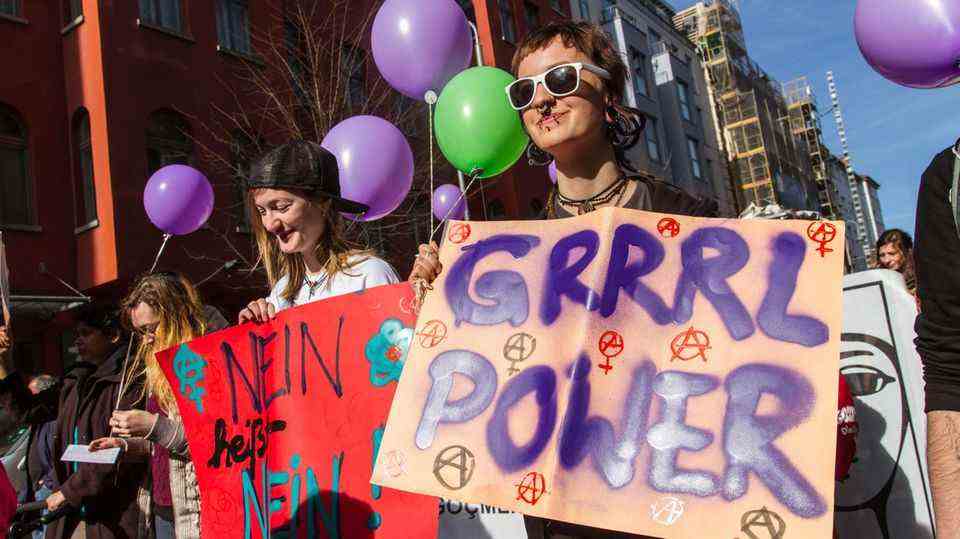Sexism in Parliament
“Where did she leave her breasts?”: What women in the Bundestag have to listen to
MPs attend a session of the Bundestag. According to a study, four out of ten female politicians complain about experiences of sexism in everyday life – including in parliament.
© Michael Kappeler / Picture Alliance
In the Bundestag, women experienced “very outrageous attacks because they are women,” complains Family Affairs Minister Anne Spiegel. Other MPs also report sexism and point primarily to the AfD. She fights back.
Sentences like “I’ll fuck you to death” reach Claudia Roth by e-mail. Insults like “Ugly Face” are the milder forms of hate messages that the Green politician has been dealing with for years, especially online. “What I encounter the most are the sexualized violent fantasies,” she says. “Men think about how they hurt a woman with sexualized violence, degrade her and kill her in her soul.”
The 66-year-old recently became Minister of State for Culture in Olaf Scholz’s new cabinet. She has been in the male-dominated Bundestag for a number of years – she also sat in the House of Representatives as Vice President until 2021.
Sexism in the Bundestag “across party lines”
When asked about sexist attacks in the Bundestag, Roth reports about “nasty objections when a woman speaks” and members of parliament who don’t even listen to women. “Women tell me they feel screened when they go to the lectern: Then there are whistles. Women are looked at from top to bottom.” In a conversation with the Minister of State, it quickly becomes clear that even if the most violent things are happening on the Internet, things in the Bundestag are anything but free of sexism.
This is also suggested by a study by the Allensbach Institute, which was published at the end of 2021. Accordingly, four out of ten politicians complain about sexism experiences in everyday life.
Federal Family Minister Anne Spiegel (Greens), who has only been in the Bundestag for a few weeks and was previously a minister in Rhineland-Palatinate, reports that she “didn’t have to ask around in Parliament for long” to find out that other women there had experienced sexism. “And across party lines.”
In the Bundestag, too, women would experience “very outrageous attacks because they are women” – a phenomenon that, according to Spiegel, is also directed against members of the LGBTIQ community, which includes gay, lesbian and transsexual people. Spiegel says of the authors: “It comes mainly from the right, from the AfD. I was told a lot about what happened in the Bundestag during the last legislative period. I found that frightening.” During her time in the Rhineland-Palatinate state parliament, she herself also experienced “interjections below the belt”.
The FDP MP Anja Schulz, who was elected to the Bundestag for the first time, also reports that women are sometimes treated differently because they are women. Her previous negative “highlight” in the plenum was a remark to another member of parliament: “Where did she leave her breasts?” She heard from the ranks of the AfD. In the new constellation of the Bundestag – younger and more female – the 36-year-old Schulz sees an opportunity to address sexism more openly. The proportion of women in parliament rose from 30.7 to 34.8 percent in this legislature.
Like men have always made it difficult for women
19 images
The family policy spokesman for the SPD parliamentary group, Sönke Rix, also refers to the AfD and says: “The AfD reduces women to the role of the ‘mother of the nation’, whose task is to give birth to children and raise them alone.” In doing so, the party is pursuing the goal of “enough German children being born so that Germany does not die out”.
Feminism and “the so-called gender madness” would threaten this goal. “I’ve often heard such nonsense from the ranks of the AfD in the family committee,” said Rix. With regard to the Bundestag, he confirms: “Yes, women experience discrimination here because of their womanhood.”
AfD complains about alleged sexism against men
In the AfD one points in the other direction. “In particular, the so-called feminists of the Greens” would stand out with sexism directed against men, says the family policy spokesman for the AfD parliamentary group, Martin Reichardt. He dismisses the accusation that his parliamentary group is intensifying sexist sentiment against women as “usual anti-AfD agitation”. The issue of sexism plays a “subordinate role” in Parliament.
These twelve women are truly exceptional people
12 images
At the same time, however, he refers to insults by AfD women. Reichardt reports that a member of parliament was insulted as a “Nazi cunt” during her speech. He claims that there are seldom calls to order with “such heckling”.
A total of 46 calls to order are recorded in the minutes of the Bundestag administration for the past election period (2017-2021). According to this, 32 of them are attributed to the AfD. As a DPA investigation revealed, only three cases involved misogynist statements. The remaining calls for order from MPs from other parliamentary groups were largely due to insults by AfD MPs and the failure to wear mouth and nose protection.
Bundestag President Bärbel Bas assures that the respective chair of the session would “resolutely counteract sexist statements in plenary sessions with clear words and, if necessary, with regulatory measures”. “Sexism or even sexual harassment is unacceptable. It is unspeakable for those affected, and if it takes place in parliament, it also violates the dignity of the house,” says the SPD politician of the DPA. The speaker of the parliament advocates “raising the issue of sexist incidents, not putting up with them and reporting them if necessary”.



